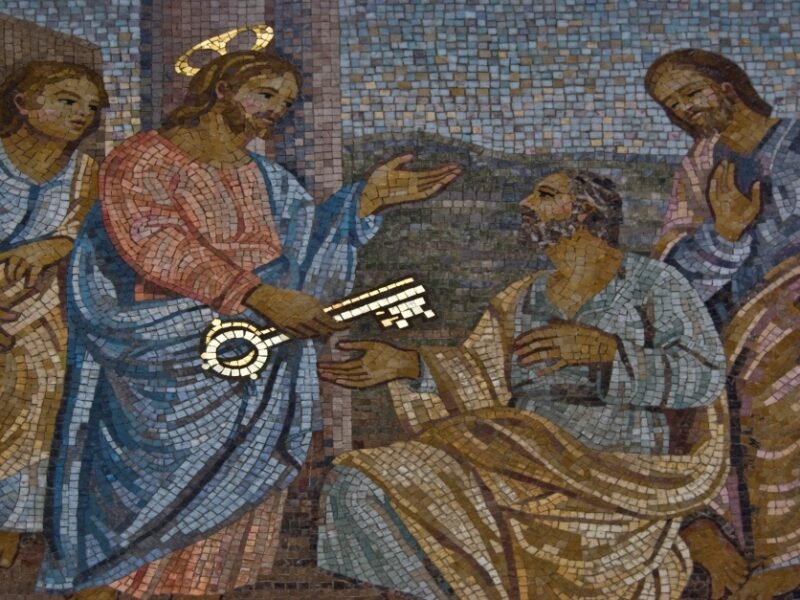What makes the use of reason vital in arriving at the catholic doctrine of the Trinity is that the Bible does not contain anything like the sort of explicit trinitarian formulas found in the Nicene or Athanasian Creeds.[1] Indeed, anti-trinitarian heretics make much of the fact that the word “Trinity” does not appear anywhere in Scripture, suggesting that the doctrine is a patristic invention.
While such reasoning might appear convincing to those with a biblicist mindset—in which Scripture is allegedly silent on a given topic if some particular word cannot be found therein—this is not a sound approach to biblical interpretation. Article VI tells us that doctrine necessary to salvation, as derived from Scripture, consists not only of what is “read therein,” but also of what “may be proved thereby.” There is a distinction, then, between doctrines that are plainly laid out in the Bible, and doctrines that are taught in the Bible but must be “proved” by logical inference and deduction. The doctrine of the Trinity falls into this second category, as evidenced by the way Browne exposits Scripture in support of it. Notably, he begins by tempering expectations for the biblical witness on the subject:
We must not expect to find the same express declarations in Scripture that we find, for instance, of the facts, that “God is a Spirit,” “God is a righteous God,” or the like. But it by no means therefore follows, that the one is less true than the other.
Having set aside the notion that biblical support for the Trinity is to be found in a prooftext, Browne sets out to demonstrate the doctrine’s biblical attestation by establishing four other “facts of Scripture”:
I. Scripture teaches, that there is One God.
II. There is, nevertheless, clear intimation of some kind of plurality in the Godhead, even in the old Testament; but in the new Testament there is a clear declaration that
The Father is God, — the Son is God, — the Holy Ghost is God.
III. This fact of the plurality is not in express terms a contradiction of the Unity; such as would be the case, if in one passage it were said, “There is one God,” and in another passage, “There are three Gods;” for it appears from Scripture, that the Father, the Son, and the Holy Ghost are but one and the same God.
IV. Still, though Father, Son, and Holy Ghost are but one God, there is plain evidence from Scripture, that the Father is not the Son, nor is either of them the Holy Ghost; but that they are clearly distinguished from one another, and distinguished, too, as Personal Agents, not merely as modes, operations, or attributes.
These four “facts of Scripture” taken together allow one to deduce the catholic doctrine of the Trinity. As Browne puts it, “If I find these four propositions clearly established in Scripture, I do not know what more can be required to prove the doctrine of this Article, that ‘in the Unity of the Godhead there be three Persons, the Father, the Son, and the Holy Ghost;’ and that these three Persons are ‘of one substance, power, and eternity.’”
We will pass over Browne’s survey of the biblical data concerning these four points, pausing only to note that it is detailed and thorough, effectively establishing the biblical grounds for each point. Having completed this, he closes by stating that “we deduce from the statements of Scripture” the catholic doctrine of the Trinity expressed in Article I.
It should not be overlooked that deduction plays such a crucial part in Browne’s presentation of the biblical testimony to the Trinity, as it shows us the occasional necessity of employing logic to elucidate biblical truths that are less than apparent. On the other hand, it should not be supposed that the involvement of such rational thought processes detracts from the primacy of divine revelation. For as we saw, four “facts of Scripture”—each of them weighty and awe-inspiring in its own right—have to be given first in order to make this deduction possible. Thus Browne’s treatment of Scriptural proof for the Trinity exemplifies the use of reason, “in humble dependence on the Divine guidance,” he says we are called to exercise.
Notes
- It might be said that 1 John 5:7—part of the so-called Johannine Comma—clearly attests to the Trinity: “For there are three that bear record in heaven, the Father, the Word, and the Holy Ghost: and these three are one.” This verse still appears in many versions of the Bible today, not least some editions of the KJV. However, given that its authenticity is debated, it behooves us not to hang trinitarian doctrine’s claim to biblical support entirely on this one, slender hook. ↑







'Reason’s Role in Discerning the Biblical Doctrine of the Trinity [Commentary on Browne: Article I (3)]' has no comments
Be the first to comment this post!